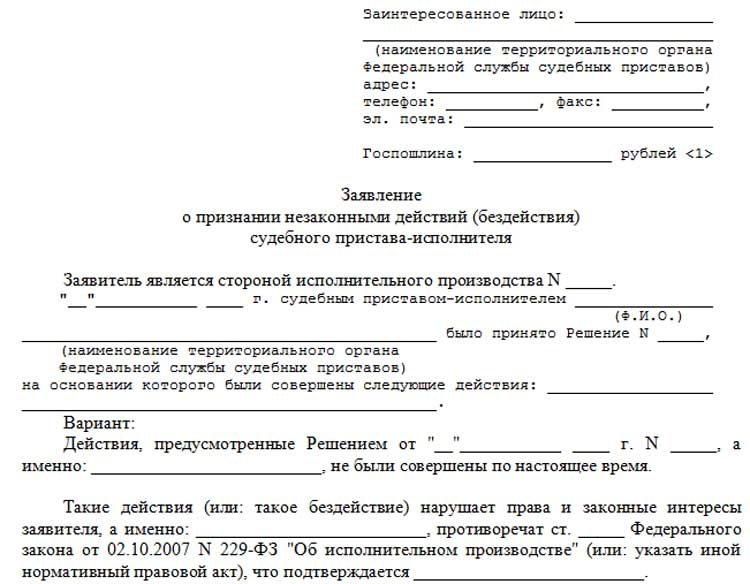Winning a case in court to recover a debt or material compensation is only half the way to satisfying the requirements presented in the statement of claim. The execution of debt obligations by the defendant is often delayed for many months or even years. The speed and completeness of the recovery of funds in favor of the plaintiff directly depend on the effectiveness of the bailiff. But often they are inactive, and enforcement proceedings do not move forward. In such cases, it is necessary to stimulate the work of bailiffs by filing a complaint with the appropriate authorities.
The duties of the bailiff are to execute the court decision, including the recovery of funds. During enforcement proceedings, the bailiff may have access to the accounts of the debtor and his property. To achieve a result and close the case as soon as possible, it is not enough to simply inform the citizen about the obligation to pay the amount determined by the court. The bailiff has the right:
- Determine the actual location of the debtor on its own or with the involvement of law enforcement agencies, including putting on the federal wanted list an individual who evades payments.
- Request information from banks about the status of accounts, the availability of securities, financial transactions of the client of interest.
- Seize debtor's debit accounts.
- Enter a citizen's home to assess and inventory property.
- Seize property for further transfer to the recoverer or sale in accordance with the accepted procedure.
- Prohibit the departure of a citizen from the territory of the Russian Federation
- In some cases, involve the employer to withhold the amount of mandatory payments from wages (for example, in the case of alimony)
However, many bailiffs limit themselves to regular calls and email notifications, which does not give any result.
What can be considered inaction
The absence of any measures capable of speeding up the payment of debts to the recoverer can be regarded as inaction. But non-execution of the court decision within 2 months does not mean that the bailiff did nothing. First you need to familiarize yourself with the course of the IP. The collector has the opportunity to contact the contractor, provide additional information about the debtor (contacts, addresses), request information about the work done.
Prior to direct collection by the court, a writ of execution must be drawn up within 3 days. If all the rules are followed, and the bailiff is not in a hurry to search for the debtor and withdraw the due amount from him, the plaintiff may file a complaint.

Where to file a complaint
The norms and rules for the interaction of all participants in enforcement proceedings are prescribed in the relevant federal law N229-FZ. It also describes the procedure for appeals in cases of inefficient work of performers.
In Russia, there is a bailiff service, which is represented in each region. Having dissatisfaction with the quality of performance of official duties of a particular bailiff, it is necessary to contact his immediate superior, a senior bailiff. A written complaint must be answered within 30 days. A greater effect will be given by filing a claim with the regional manager of the service or posting a complaint on the official website of the FSSP. In this case, the case will be under the control of the higher management until the full completion of the production.
The prosecutor's office also has the authority to control the work of the SSP. On the basis of the claimant's complaint, within a period of not more than 1 month, an internal audit must be carried out on the fact of violation of the rights of a citizen as a result of the inaction of the executor. As a result, punishment measures are taken against an unscrupulous employee, and the requirements of the exactor are satisfied.
It is possible to recognize the inaction of the bailiff as illegal through the district court by filing a statement of claim. In less than 10 days, a decision is made, in most cases in favor of the plaintiff. Litigation costs are paid by the FSSP.
Rules for filing a complaint
In order for the regulatory authorities to correctly respond to the complaint, it is important to draw it up correctly. When contacting through the site, you can use the proposed forms. If the document is compiled independently, the following information is required:
- Service or body to which the complaint is directed.
- Details of the applicant (name, contacts)
- Information about the bailiff against whom the complaint is being made.
- Summary of the court decision and the number of the court proceedings.
- Signs of inaction of the employee leading the IP.
- List of violated rights of the applicant.
- The essence of the complaint is a request for recognition of the fact of inaction of the bailiff and his violation of the current legislation.
- Date, signature.
If there is documentary evidence, it is important to attach it to the complaint. This will facilitate the decision of the supervisory authorities in favor of the applicant.
The bailiff is obliged to enforce the court decision, that is, the plaintiff must receive the amount due from the debtor within the time period established by law. There are circumstances that objectively prevent this. But if the enforcement proceedings do not move only due to inaction, the recoverer has the right to complain about it to higher authorities in order to restore their own rights.

